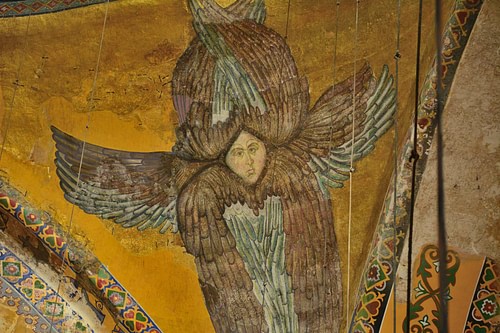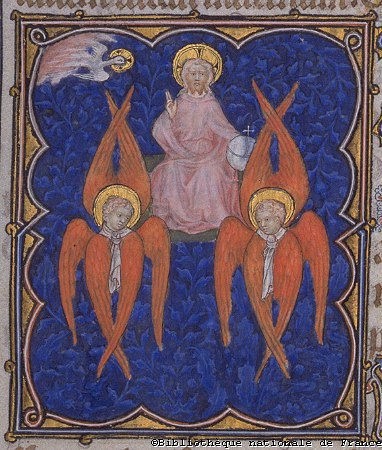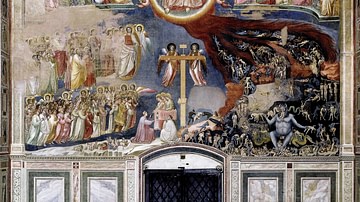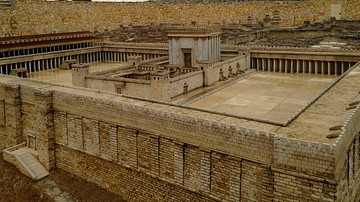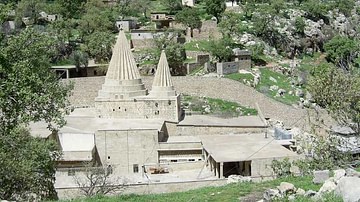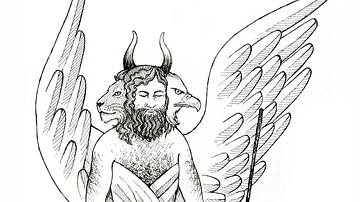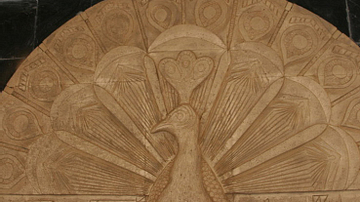The concept and function of angels in ancient Judaism were some of the many elements incorporated from contemporary cultures and religious views. The Hebrew malakh was translated into the Greek angelos, both of which indicated not their nature, but their function as "one who is sent" or "a messenger." Angels were a form of divination or the way gods communicated their will to humans.
The Ancient View of the World
All ancient peoples perceived their world as a three-tiered structure of the universe:
- Heavens – the upper domain of the gods.
There was often a "king of the gods", who ruled over lower and subservient gradients of divinity. The lowest level of divine beings were the daemons (Greek for "attendant"), who, over time, as "demons" became responsible for evil and what went wrong in life. - Earth – the domain of animals and humans.
The lower divinities were assigned responsibility for specific areas of human culture such as agriculture, craftsmanship, and war. Gods and lesser divinities could possess humans, with the ability to speak in their name. These oracles were both a person and a place. - Underworld – the land of the dead.
Originally the place for all the dead, ideas were eventually expanded to describe separate places for the righteous and wicked dead. Gods and lesser divinities were the only ones who could visit the land of the dead and return.
A shared cultural concept of all ancient religions was the experience of divine encounters with the gods and the lesser divinities. Dreams or visions, such encounters were also described as epiphanies, manifestations of the divine on earth.
Divine Agency
Kings had courts of nobles and advisers. This concept was projected onto heavenly courts with the king of the gods surrounded by divine beings who functioned in the same capacity. Scholars refer to this as 'divine agency'. These beings spoke for the gods to deliver messages to humans. In this function, they simultaneously validated the teachings and law codes of the gods.
In Mesopotamian religion, these beings were often referred to as sages, who helped organize the universe and imparted the civilized arts of literacy and technology. We have some of the earliest representations of gods and angels with anthropomorphic visages, adding weapons, war helmets, and wings. In the Persian state cult of Zoroastrianism, Ahura Mazda, a being of pure good, emanated the spenta mainyu (creative spirit/mentality) in pairs of males and females who procreated. These beings created both the physical universe and humans. At the opposite end of the polarity of Ahura Mazda was druj, chaos, disorder, personified as Ahriman.
The spenta mainyu were often referred to with the term yazata, to distinguish them from the agents of Ahriman. Yazata was Persian for a being worthy of worship through song and sacrifices. Thus the oppositional polarity of good against evil (angels vs demons), with constant battles between the two forces. The idea that humans had a guardian angel arose from Zoroastrianism.
The Jewish Heaven
With cultural contact through trade and war, Jews absorbed neighboring concepts. Jews conceived a similar hierarchy of powers in heaven: sons of God (understood as angels who were addressed by God in Genesis 1 and Genesis 6), archangels, seraphim, and cherubim. The seraphim ("fiery") and cherubim were the highest ranks of angels who surrounded the throne of God and continually sang his praises.
The foundational story for the idea that Jews were monotheistic (the modern concept of "belief in one God") was when Moses received the ten commandments from God on Mount Sinai: "I am the Lord your God…You shall have no other gods before me" (Deuteronomy 5:6-7). This does not indicate that other gods do not exist; it was the God of Israel who created all the other gods and would ultimately judge and destroy them. "No other gods before me" was a commandment that the Jews were not to worship any other gods. We combine worship with belief and veneration, which are all modern terms, but worship in the ancient world always meant sacrifices. Sacrifices (animals, vegetables, libations) were only to be offered to the God of Israel.
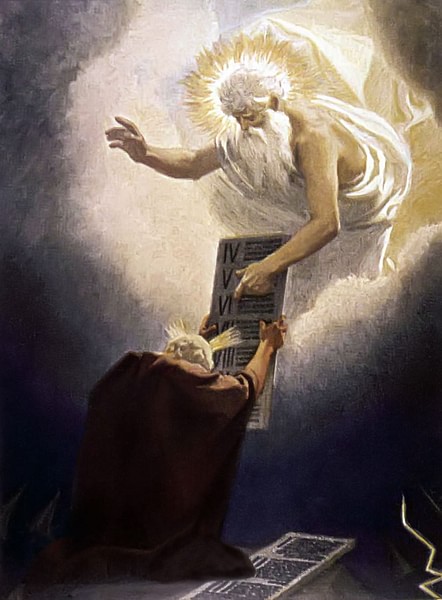
The Jewish texts consistently refer to the existence of the gods of the nations (Greek ethnos, meaning "ethnic groups"). For example, Psalm 82:1 reads: "God has taken his place in the divine council; in the midst of the gods he holds judgment." In the story of the Jews' exodus from Egypt, God battled against the priests and the gods of Egypt to demonstrate who controls nature. This makes little sense if their existence and authority were not recognized: "… on all the gods of Egypt I will execute judgments" (Exodus 12:12). What became the concept of Jewish monotheism took centuries to evolve.
A Jewish example of divine agency is found in the Book of Job (collected from the 7th to 3rd centuries BCE):
One day the heavenly beings ['sons of God'] came to present themselves before the Lord, and the accuser also came among them. The Lord said to the accuser, "Where have you come from?" The accuser answered the Lord, "From going to and fro on the earth and from walking up and down on it.
(Job 1:6-8)
The "accuser" is called ha-satan in Hebrew, meaning "obstacle" or "adversary", which describes his function. His job was to place obstacles in front of humans, forcing them to make a choice between good and evil. As the accuser, he functioned as God's prosecuting attorney in a sense. God ordered ha-satan to oppress Job in everything except for his life. God was sure that Job would not abandon him. Details were added over time to this character so that his formal name became Satan, including the background that he was a rebellious, fallen angel. Satan became the oppositional foe of God and humans and is always juxtaposed with the loyal, beneficial angels.
Angels in the Jewish Scriptures
Throughout the book of Genesis, God and angels appear together on earth, but there is often a "morphing" (transformation) in the juxtaposition of God and angels. When Hagar and her son Ishmael are sent out of the camp by Sarah, she receives revelations from both angels and God. An angel tells her that her son Ishmael will survive, but "God opened her eyes" and "God was with the boy" (Genesis 21:19-20)
In a similar story in Genesis 18:1-2, "The Lord appeared to Abraham by the oaks of Mamre, as he sat at the entrance of his tent in the heat of the day. He looked up and saw three men standing near him." Abraham offered them hospitality. "They said to him, 'Where is your wife Sarah?' And he said, 'There, in the tent.' Then one said, 'I will surely return to you in due season, and your wife Sarah shall have a son'" (Genesis 18:9-10). It is not clear whether this is an angel or God speaking.
We also see this merging of God and an angel in the sacrifice of Isaac:
He said, "Take your son, your only son Isaac, whom you love, and go to the land of Moriah and offer him there as a burnt offering on one of the mountains that I shall show you.” ... But the angel of the Lord called to him from heaven ... "Do not lay your hand on the boy or do anything to him, for now I know that you fear God, since you have not withheld your son, your only son, from me."
(Genesis 22:2-12)
Here, the "angel of the Lord" identifies himself as God with the use of "me".
Throughout the Jewish Scriptures, the phrase "an angel of the Lord" distinguished these beings from the lesser divinities of other gods. The Hebrew for 'angel' (malakh) may have derived from the term m'lachah, ("labor" or "work") used most often for describing the details of the commandment of the Sabbath. God rested after the creation of the world, so angels had to do the 'work' of God on earth. They function not only as messengers of God's plan but also as agents and guardians who both punish Jews for the neglect of the commandments and rescue Jews from oppressors. Psalm 91:9-13 reads:
Because you have made the Lord your refuge,
the Most High your dwelling place,
no evil shall befall you,
no scourge come near your tent.For he will command his angels concerning you
to guard you in all your ways.
On their hands they will bear you up,
so that you will not dash your foot against a stone.
You will tread on the lion and the adder;
the young lion and the serpent you will trample under foot.
Angels later became aligned with the persecution of Jews. In the Book of Daniel, he is rescued by an angel from the lions' den, and an angel rescues his three friends from a fiery furnace.
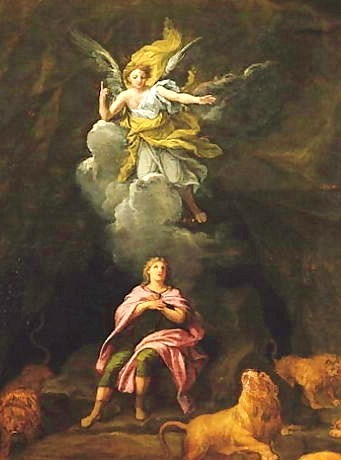
The Books of the Prophets
The prophets of Israel were the Jewish equivalent of oracles in the concept of divination, how gods communicated with humans. Possessed by the spirit of God, it was considered the words of God himself that they pronounced. We have very few references to angels on earth, but detailed visions of heaven.
Ezekiel was both a priest and a prophet who lived during the Babylonian conquest in the 6th century BCE. Ezekiel has a complicated vision of the presence of God on his throne:
As I looked, a stormy wind came out of the north: a great cloud with brightness around it and fire flashing forth continually and in the middle of the fire something like gleaming amber. In the middle of it was something like four living creatures. This was their appearance: they were of human form. Each had four faces, and each of them had four wings. Their legs were straight, and the soles of their feet were like the sole of a calf’s foot, and they sparkled like burnished bronze. Under their wings on their four sides they had human hands. And the four had their faces and their wings thus: their wings touched one another; each of them moved straight ahead, without turning as they moved. As for the appearance of their faces: the four had the face of a human being, the face of a lion on the right side, the face of an ox on the left side, and the face of an eagle; such were their faces. Their wings were spread out above; each creature had two wings, each of which touched the wing of another, while two covered their bodies.
(Ezekiel 1:4-11).
It should be noted that artists have always had difficulty portraying this complicated vision of the throne.
Angels as Mediators
After the conquests of Alexander the Great (r. 336-323 BCE), Greek culture, religion, and practices permeated the regions of the Middle East. We begin to have more descriptions of angels as mediators in the literature. This distinguished God from Greek mythology, where the gods often came to earth and, like Zeus, mated with human women, where the offspring became "the heroes of Archaic Greece. The God of Israel created through speech, did not procreate, and in this later period, did not visit humans on earth.
The apocryphal book of Jubilees has the earliest reference to God giving the Law of Moses on Sinai through an angelic mediator: "And [God] said to the angel of the presence, 'Write for Moses'" (1:27). The Jewish philosopher, Philo of Alexandria, wrote that Moses had received the title of mediator in his role of establishing the Law (Life of Moses). The 1st-century Jewish historian, Flavius Josephus (36-100 CE) explained: "And for us, we have learned from God the most excellent of our doctrines, and the most holy part of our Law, by angels [Greek: "ambassadors"]" (Antiquities of the Jews, XV:163).
After the death of Alexander the Great, during the Wars of the Diadochi, his generals divided up the region, dominated by the Seleucid Empire in Syria, and the Ptolemaic Dynasty of Egypt. The Maccabean Revolt drove out the Greeks, but then Rome conquered Judea in 63 BCE. And yet the kingdom of God still did not become manifest.
Apocalyptic Judaism & The Books of Enoch
During this period, we no longer have traditional prophets. Rather, seers went into ecstatic trances and had out-of-body journeys to heaven where angels revealed secrets ("apocalypse" means "secrets revealed" in Greek), with a renewed urgency to restore the nation of Israel. In the tradition of ancient wisdom literature, all aspects of the universe, including the mysteries of nature, and especially the fate of humans in heaven and hell were now imparted by angels.
There are a series of texts attributed to Enoch, ranging from 300-100 BCE. Genesis 5 relates the descendants of Adam: "Enoch walked with God; then he was no more, because God took him" (Genesis 5:24). A possible interpretation is that Enoch did not physically die but was translated to heaven. As such, Enoch was considered a valid guide for details in heaven which were added in this book.
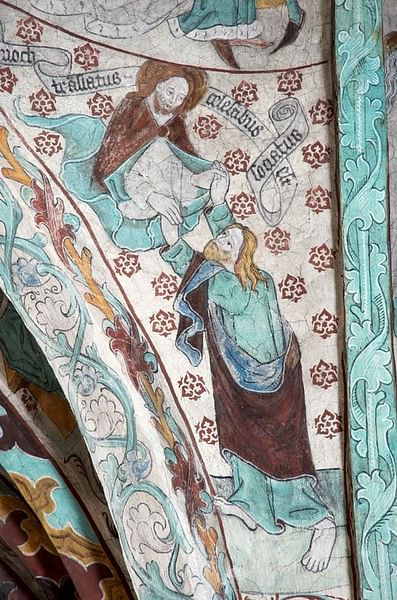
1 Enoch tells the story of the "sons of God" (the angels) who bred with human women and one of the reasons why God limited the lifespan of humans. Angels were also condemned for teaching humans the art of metallurgy, which led to the evils of weapons and money. They were tossed down into the abyss, the lower pits of She'ol (hell). Because Enoch was in heaven, they appeal to him to intercede with God to have them released, unsuccessfully. Condemned to hell, these fallen angels remain under the rule of Satan. As Satan's ambassadors, they act as his agents to visit earth and tempt humans into sin.
In a subsequent text known as the Book of the Watchers, we have names and assignments of angels:
Uriel, ..., who is over the world and over Tartarus.
Raphael, ..., who is over the spirits of men.
Raguel, ..., who takes vengeance on the world of the luminaries.
Michael, ..., to wit, he that is set over the best part of mankind and over chaos.
Saraqael, ..., who is set over the spirits, who sin in the spirit.
Gabriel, ..., who is over Paradise and the serpents and the cherubim.
Remiel, ... whom God set over those who rise."(Enoch 20)
In Enoch 46 and 48, we encounter the "son of man", who would be the final judge of all humans. Later Christians would claim that "the son of man" was a pre-existent form of Jesus Christ as the messiah.
And there I saw one who had a head of days, and his head was white like wool, and with him was another being whose countenance had the appearance of a man, and his face was full of graciousness, like one of the holy angels. And I asked the angel who went with me and showed me all the hidden things, concerning that son of man, who he was, and whence he was, (and) why he went with the head of days? And he answered and said unto me: "This is the son of man who hath righteousness, with whom dwelleth righteousness, and who revealeth all the treasures of that which is hidden, because the Lord of spirits hath chosen him, and whose lot hath the pre-eminence before the Lord of spirits in uprightness for ever. ... And at that hour that son of man was named in the presence of the Lord of spirits, and his name before the head of days. Yea, before the sun and the signs were created, before the stars of the heaven were made, his name was named before the Lord of spirits. He shall be a staff to the righteous whereon to stay themselves and not fall, and he shall be the light of the Gentiles, and the hope of those who are troubled of heart. All who dwell on earth shall fall down and worship before him, and will praise and bless and celebrate with song the Lord of spirits.
Jewish Sects
Various groups of Jews had their own views of angels. The Essenes at Qumran systematized a hierarchy of angels. In the final battle, a "prince of light" and other angels will fight alongside "the sons of light" (their own group) against the "sons of darkness" (those who disagreed with their views). We know little about the views of the Pharisees due to an absence of any surviving Pharisee literature in the 1st century, although Pharisees promoted the concept of a final resurrection of the dead. Both Josephus and the Acts of the Apostles claimed that the Sadducees did not believe in angels, nor in the resurrection of the dead. No writings of the Sadducees have survived. However, the Sadducees were known for accepting only what was written in the Scriptures, and perhaps they dismissed the apocryphal concepts of angelology as too mystical.
Promoting the God of Israel with sacrifices only to him, there is little evidence that a cult of angels emerged. However, a text known as Sefer HaRazim ("Book of Secrets") claimed that this is where King Solomon obtained his wisdom, which included magical powers. The text is dated to the late 3rd and early 4th century CE but was based upon older material. We have evidence of Jewish magical papyri as well as inscriptions, amulets, ostraca (writing on pottery shards), and special incantation bowls. Appreciating the God of Israel as a powerful being, Gentiles utilized these Jewish incantations as well. This was not worship of angels, but petitions to the angels as God's representatives for individual and community benefits.

